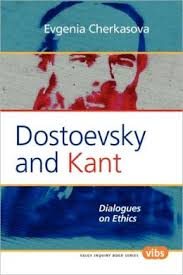Teaching philosophy is a great privilege. You get to discuss and play with some of the most interesting and original ideas humanity has produced! And you get to do it in a good company of young enthusiastic people.
I am fortunate to work in a place where I can offer courses on a great variety of subjects, from critical thinking to philosophy of art, from intro ethics to upper level Kant seminar, from modern philosophy to existentialism. Sometimes I even have the pleasure of doing advanced work with students on a topic close to my heart. For instance, I teach a graduate course on Dostoevsky and Russian philosophy; I have turned a freshmen course into a multimedia platform (the Meaning of Life project funded by the National Endowment for the Humanities); and I have been working on a computer game with colleagues and students.
Here are the descriptions of some my courses:
The NEH Meaning of Life COURSE
What do we live for? Which beliefs, values, and experiences sustain meaningful, fulfilling existence? Are we authors of our destinies or powerless pawns in an unfathomable cosmic game? Does death render all our efforts superfluous? This course offers a cross-cultural, interdisciplinary exploration of these questions through philosophical and religious texts, art, fiction, autobiography, and psychological studies. The course opens with the Old Testament’s book of Ecclesiastes, a series of reflections on the fleeting character of life, followed by three units. 1) A Life Worth Living: Humanity’s Ideals focuses on the ancient and modern visions of human flourishing; 2) Threats to Meaning: Humanity’s Discontents, discusses the disillusionments leading to the loss of meaning; and 3) Recovery of Meaning: Crises and Hopes, presents possibilities of self-discovery and growth as a result of a crisis. The course is open to all majors and has no prerequisites.
Existentialism
This course will introduce students to existentialism, a branch of contemporary philosophy that finds its expression in philosophical and literary texts of many diverse writers worldwide. The term itself suggests its major concern: emphasis on concrete individual existence, radical subjectivity, and the individual’s free choice of his/her own destiny. We will study the works of Kierkegaard, Nietzsche, Dostoevsky, Kafka, Sartre, Camus and others. Some writers who are traditionally associated with existentialism are deliberately unsystematic in exposition of their philosophy; therefore, we will have to pay careful attention not only to their ideas, but also to the existentialist modes of expression: narrative, parable, aphorism, metaphor, and paradox. The following interrelated themes will be explored: paradoxes and contradictions of human nature; radical freedom, commitment and responsibility; anxiety, absurd, rebellion; authenticity and self-deception; alienation and community. Throughout the course we will also explore the field of existential psychology and psychotherapy.
Profiles in Philosophy: Kant
This course will introduce students to the writings of Immanuel Kant (1724-1804). The course will be structured around the four fundamental questions formulated by Kant: 1) What can I know? 2) What ought I to do? 3) What may I hope? and 4) What is man? We will explore the following themes:
1) Structures of our knowledge of nature and the empirical world; the limits within which human reason can legitimately formulate theories, propose hypothesis, and discover laws; the possibility of any knowledge of God, the soul and other metaphysical entities; and the antinomies (paradoxes) of pure reason.
2) Kant’s contribution to ethics: his theory of unconditional morality based on duty; the idea of the categorical imperative; freedom and rationality in ethics; autonomy and universal moral law; and the problem of evil.
3) We will read excerpts from Kant’s political writings and from his Critique of Practical Reason. Topics for discussion will include: the human hope for eternal life and for attainment of happiness proportionate to virtue; hopes for political progress of humanity and achievement of the cosmopolitan ideal; Kant’s triumphant view of a human being as rational, autonomous, and creative.
Dostoevsky and Russian Philosophy
In this course we will study the nineteenth-century Russian novelist Feodor Dostoevsky and his contribution to Russian philosophy. Dostoevsky’s stories, which weave together philosophical reflections, unique personalities and gripping plots, earned the author numerous superlative titles. Dostoevsky has been praised as a literary genius, a prophetic political thinker, a keen psychologist and an expert on human nature and human condition. His work inspired generations of intellectuals, among them prominent European thinkers: Nietzsche, Freud, Heidegger, Sartre, Camus, Hesse and many others. In addition to a detailed study of Dostoevsky’s writings we will explore the socio-political, literary and intellectual contexts in which he developed as a thinker. Various excerpts from the 19th and 20th century texts will introduce the central themes of Russian philosophy: the meaning of individual existence, the meaning of suffering, the problem of freedom and anarchy, the conflict between “life” and “theory,” and the nature of history. Dostoevsky’s own texts will be complemented by the works of both his philosophical opponents and admirers.






